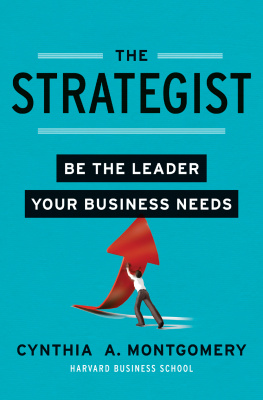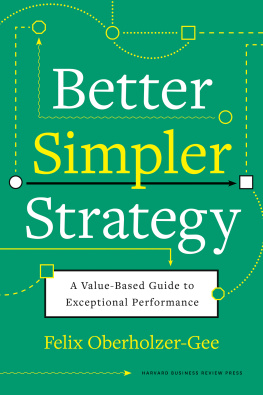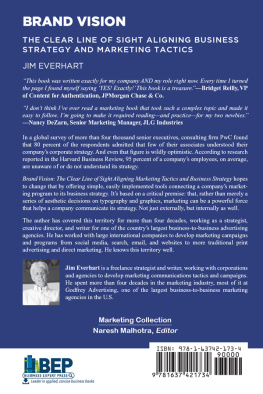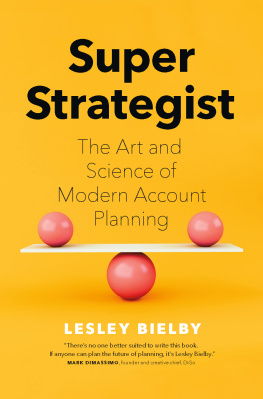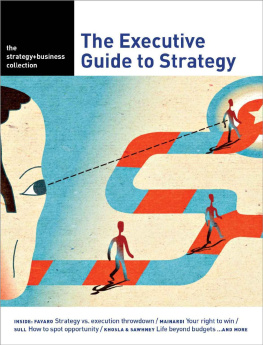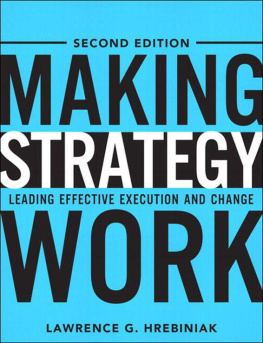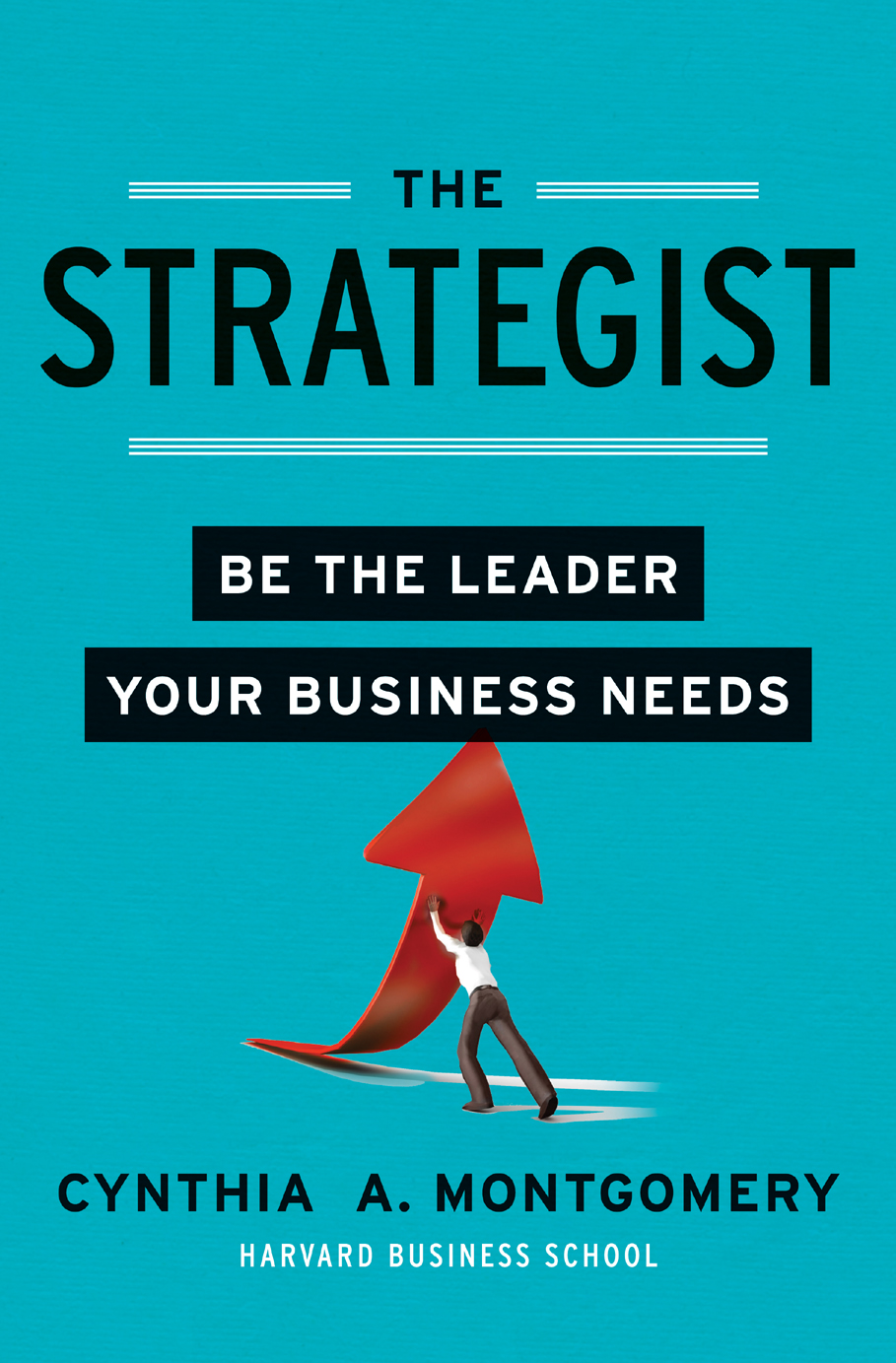Cynthia A. Montgomery
In the end, it is important to remember that we cannot become what we need to be by remaining what we are.
Introduction
What I Learned in Office Hours
Y OURE ABOUT TO get a revisionist view of strategy. Its not that what youve learned is incorrect. Its that its incomplete.
Strategy is a fundamental course at nearly every business school in the world. I have been privileged to teach variations of it for more than thirty yearsfirst at the University of Michigan, then at the Kellogg School at Northwestern, and for the last twenty-plus years at the Harvard Business School.
For most of that time I worked with MBA students, until the center of my teaching shifted to executive education. It was this experience, particularly a five-year stint in Harvards Entrepreneur, Owner, President program (EOP), that inspired this book. Working intimately with leaders from nearly every industry and nation as they confronted their own real-world strategic issues changed not only how I teach strategy, but, more fundamentally, how I think about it. The experience led me to challenge some of strategys basic precepts, and ultimately to question both the culture and mind-set that have grown up around it. Even more important, teaching in EOP forced me to confront how strategy is really made in most businesses, and by whom.
All of this convinced me that it is time for a change. Time to approach strategy in a different way and time to transform the process from a mechanical, analytical activity to something deeper, more meaningful, and far more rewarding for a leader.
THE ROAD TO HERE
Fifty years ago strategy was taught as part of the general management curriculum in most business schools. In the academy as well as in practice, it was identified as the most important duty of the presidentthe person with overarching responsibility for setting a companys course and seeing the journey through. This vital role encompassed both formulation and implementation: thinking and doing combined.
Although strategy had considerable depth then, it didnt have much rigor. Heuristically, managers used the ubiquitous SWOT model (Strengths, Weaknesses, Opportunities, and Threats) to assess their businesses and identify attractive competitive positions. How best to do that, though, was far from clear. Other than making lists of various factors to consider, managers had few tools to help them make these judgments.
In the 1980s and 90s, my colleague Michael E. Porter broke important new ground in the field. His watershed came in firming up the Opportunities and Threats side of the analysis by bringing much-needed economic theory and empirical evidence to strategys underpinnings, providing a far more sophisticated way to assess a firms competitive environment. This led to a revolution in both the practice and teaching of strategy. In particular, managers came to understand the profound impact industry forces could have on the success of their businesses and how they could use that information to position their firms propitiously.
Advances over the next few decades not only refined the tools but spawned a whole new industry. Strategy in many ways became the bailiwick of specialistslegions of MBAs and strategy consultants, armed with frameworks, techniques, and dataeager to help managers analyze their industries or position their firms for strategic advantage. In truth, they had a lot to offer. My own academic training and research in this period reflected this intellectual environment, and what I did in the classroom for many years thereafter was a living embodiment of this new field of strategy.
In time, though, a host of unintended consequences developed from what in its own right was a very good thing. Most notably, strategy became more about formulation than implementation, and more about getting the analysis right at the outset than living with a strategy over time. Equally problematic, the leaders unique role as arbiter and steward of strategy had been eclipsed. While countless books have been written about strategy in the last thirty years, virtually nothing has been written about the strategist and what this vital role requires of the person who shoulders it.
It wasnt until years into this shift that I fully realized what had happened. It was classic Shakespeare: As a field, we had hoisted ourselves on our own petard. We had demoted strategy from the top of the organization to a specialist function. Chasing a new ideal, we had lost sight of the value of what we hadthe richness of judgment, the continuity of purpose, the will to commit an organization to a particular path. With all good intentions, we had backed strategy into a narrow corner and reduced it to a left-brain exercise. In doing so, we lost much of its vitality and much of its connection to the day-to-day life of a company, and we lost sight of what it takes to lead the effort.
Teaching in the EOP program drove these insights home for me.
When I first started working with the group, I used a curriculum that was much like one I would use in any executive program. Through a series of class discussions and presentations, we discussed the enduring principles of strategy, the frameworks that capture them, and a series of case studies that brought the concepts and tensions alive. We still do thatand its a valuable part of what we do.
But in between class sessions, the EOP studentsall accomplished executives and entrepreneursstarted to ask if they could meet me in my office to talk about various situations they were facing in their companies. These conversations often took place at unusual hours, and sometimes lasted far into the evening. Most started out predictably enough: We talked about the conditions in their industries, the strengths and weaknesses of their own companies, and their efforts to build or extend a competitive advantage. Some discussions ended there, and a thoughtful application of whatever wed been doing in class seemed to meet the need.
Often, though, these conversations took a different turn. Alongside all the conventional questions were ones about what to do when the limits of analysis had been reached and the way forward was still not clear; questions about when to move away from an existing competitive advantage and when to try to stay the course; questions about reinventing a business or identifying a new purpose, a new reason to matter. Even though many of the companies at issue were remarkably successful (one had grown from a start-up to $2 billion in revenue in just nine years), almost none had the kind of long-run sustainable competitive advantage that strategy books tout as the Holy Grail.
Working with these managers, typically over three years, and hearing the stories within the stories, I came to see that we cannot afford to think of strategy as something fixed, a problem that is solved and settled. Strategythe system of value creation that underlies a companys competitive position and uniquenesshas to be embraced as something open, not something closed. It is a system that evolves, moves, and changes.
In these late-night one-on-one conversations, I also saw something else: I saw the strategist, the human being, the leader. I saw how responsible these executives feel for getting things right. I saw how invested they are in these choices, and how much is at stake. I saw the energy and commitment they bring to this endeavor. I saw their confidential concerns, too: Am I doing this job well? Am I providing the leadership my company needs?

